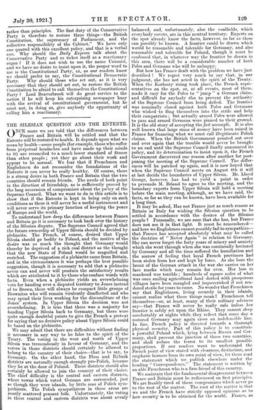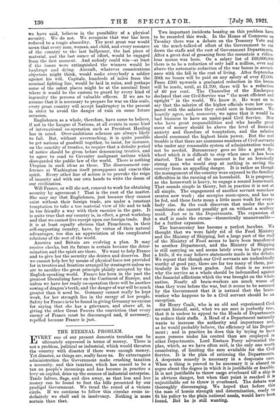THE SILESIAN QUESTION AND THE ENTENTE.
ONCE more we are told that the differences between France and Britain will be settled and that the Entente will be restored to health. It depends upon what we mean by health—some people (for example, those who suffer from perpetual headaches and have made up their minds to it) are reconciled to a much lower standard of fitness than other people ; yet they go about their work and appear to be normal. We fear that if Frenchmen and Englishmen do not reconsider the foundations of the Entente it can never be really healthy. Of course, there is a strong desire in both France and Britain that the two countries should remain friends. The needs of both point in the direction of friendship, as is sufficiently proved by the long succession of compromises about the po'icy of the Supreme Council. What we want to do in this article is to show that if the Entente is kept in being only on such conditions as these it will never be a useful instrument and will never serve its primary function of keeping the peace of Europe and the world.
To understand how deep the differences between France and Britain go it is necessary to look back over the history of the Silesian dispute. The Supreme Council agreed that the future ownership of Upper Silesia should be decided by plebiscite. The French, of course, desired that Upper Silesia should go bodily to Poland, and the motive of the desire was as much the thought that Germany would thereby be deprived of a rich coal district as the thought that the new State of Poland would be magnified and enriched. The suggestion of a plebiscite came from Britain, and in the circumstances it was perhaps the best possible suggestion, though it is necessary to add that a plebiscite never can and never will produce the satisfactory results which are attributed to it by those who confuse words with facts. Even when a plebiscite yields an overwhelming vote for handing over a disputed territory to Jones instead of to Brown, there will always be compact little groups of Brownites who will remain virulently disaffected and who may spend their lives working for the discomfiture of the Jones' system. In Upper Silesia the decision was not overwhelming. It is true that there was a majority for handing Upper Silesia back to Germany, but there were quite enough doubtful points to give the French a pretext for saying that no decisive policy about Upper Silesia could be based on the plebiscite. . We may admit that there are difficulties without finding it necessary in any way to be false to the spirit of the Treaty. The voting in the west and north of Upper Silesia was tremendously in favour of Germany, and the voters in those districts should certainly be allowed to belong to the country of their choice—that is to say, to Germany. On the other hand, the Pless and Rybnik districts are naturally enough strongly pro-Polish, because they lie at the door of Poland. These districts should also certainly be allowed to join the country of their choice. The chief difficulty is the central and eastern districts, where towns which voted German are surrounded, just as though they were islands, by little seas of Polish sym- pathizers. The Polish sympathizers in these areas are mostly scattered peasant folk. Unfortunately, the voting in these central and eastern districts was about evenly balanced, and, unfortunately, also the coalfields, which everybody covets, are in this neutral territory. Experts on the spot already know the facts, however, so far as these can possibly be known. A frontier could be drawn which would be reasonable and tolerable for Germany, and also reasonable and tolerable for Poland, though it must be confessed that, in whatever way the frontier be drawn in this area, there will be a considerable number of both Poles and Germans who will be unhappy. But how has France dealt with the problem we have just described ? We regret very much to say that, in our judgment, she has not acted in the spirit of the Treaty. When the Korfanty rising took place, the French repre- sentatives on the spot, or, at all events, most of them, made it easy for the Poles to " jump " a German claim, and difficult for anybody else to prevent the authority of the Supreme Council from being defied. The frontier was nominally closed against both Poles and Germans who wished to fling themselves into the strife and help their compatriots ; but actually armed Poles were allowed to pass and armed Germans were pinned to their ground. It is the old story of accepting the fait accompli. It is also well known that large sums of money have been raised in France for financing what we must call illegitimate Polish claims. When the British Government pointed out over and over again that the trouble would never be brought to an end until the Supreme Council finally announced its policy, and its determination to insist upon it, the French Government discovered one reason after another for post- poning the meeting of the Supreme Council.' The differ- ences will be patched up again, and it is now hoped that when the Supreme Council meets on August 4th it will at last decide the boundaries of Upper Silesia. Mr. Lloyd George, however, has had to yield a point in order to persuade M. Briand to agree to the meeting, and the boundary experts from Upper Silesia will bold a meeting before the main meeting, although, as we have said, the facts, so far as they can be known, have been available for a long time. It may be asked, Has not France just as much reason as Britain or Italy for wishing the Silesian question to be settled in accordance with the desires of the Silesian people ? Personally, we are sure that she has, but France does not see it in that light. It must be remembered— and here we Englishmen cannot possibly fail to sympathize— that France has accepted absolutely what may be called the doctrine of "Never Again" in relation to Germany. She can never forget the forty years of misery and anxiety which she went through when she was continually hectored by Germany and all the time suffered the humiliation and the sorrow of feeling that loyal French provinces had been stolen from her and kept by force. As she bore the brunt of the German attack in the war she carries on her face marks which may remain for ever. Her loss in manhood was terrible ; hundreds of square miles of what was once smiling agricultural land dotted with prosperous villages have been mangled and impoverished if not ren- dered sterile for years to come. No wonder that Frenchmen say that Englishmen, living securely in their islands, cannot realize what these things mean I Frenchmen tell themselves—or, at least, many of their military advisers say—that France will never be really safe unless her frontier is safely set upon the Rhine. They cannot sleep comfortably at nights while they reflect that some day a restored Germany may again cross an indefensible line. In fine, French policy is directed towards a thorough physical security. Part of this policy is to constitute a powerful Poland which, lying between Russia and Ger- many, shall prevent the junction of those two countries, and shall reduce the terror to its smallest possible proportions. If our readers want to understand the French point of view stated with clearness, distinction, and emphatic fairness from its own point of view, let them read the statement which we publish elsewhere under the heading "Correspondence." The statement is written by an able Frenchman who is a firm friend of this country.
We maintain that the fundamental disagreement between France and Britain must be rediscussed on first principles.
We are frankly tired of these compromises which never go to the root of the matter. The root of the matter is that we and the French have strictly opposed opinions as to how security is to be obtained for the world. France, as We have said, believes in the possibility of a physical security. We do not. We recognize that war has been reduced to a tragic absurdity. The next great war would mean that every man, woman, and child, and every resource of the country to the last halfpenny, the last piece of material, and the last ounce of effort, would be engaged from the first moment. And nobody could win—at least if the losers were extinguished the winners would be bankrupt and dying. Aircraft, whatever conscientious objectors might think, would make everybody a soldier against his will. Capitals, hundreds of miles from the nominal fighting line, would be laid in ruins, and perhaps some of the safest places might be at the nominal front where it would be the custom to guard by every kind of ingenuity the persons of valuable officers. If we are to assume that it is necessary to prepare for war on this scale, every great country will accept bankruptcy in the present in order to avoid the danger of ruin on some future occasion.
Englishmen as a whole, therefore, have come to believe, if not in the League of Nations, at all events in some kind of international co-operation such as President Harding has in mind. Over-ambitious schemes are always likely to fail. But, without overreaching, it is quite possible to get nations of goodwill together, to insist, for instance, on the sanctity of treaties, to require that a definite period of notice should be given before denouncing treaties, and to agree to send to Coventry malignant nations which disregarded the public law of the world. There is nothing Utopian in such ideas as these. The disarmament con- ference at Washington itself presupposes and exacts this spirit. Every other line of action is to provoke the reign of insanity and with our own hands to write the doom of our civilization.
Will France, or will she not, consent to work for obtaining security by agreement ? That is the root of the matter. She may say that Englishmen, just because they cannot exist without their foreign trade, are under a constant temptation to take a too material view of life and to talk in too friendly a way with their enemies in the gate. It is quite true that our country is, in effect, a great workshop and that we cannot live except upon our foreign trade. But it is at least equally obvious that Frenchmen, in their self-supporting country, have, by virtue of their natural advantages, too dim an appreciation of the complicated relations of the rest of the world.
America and Britain are evolving a plan. It may receive checks, but its future is certain because the deter- mination and the spirit are there. We want to help France and to give her the security she desires and deserves. But we cannot help her by means of physical force not provided for in treaties and frontiers arranged by stratagem unless we are to sacrifice the great principle plainly accepted by the English-speaking world. France has been in the past the greatest liberalizing force on the Continent of Europe, and unless we have her ready co-operation there will be another sowing of dragon's teeth, and the danger of war will be much greater than it need be. Germany cannot really be kept weak, for her strength lies in the energy of her people. Safety for France is to be found in giving Germany no excuse for saying that she has a grievance, and above all, in giving the other Great Powers the conviction that every enemy of France must be discouraged and, if necessary, repelled because France is just.



































 Previous page
Previous page